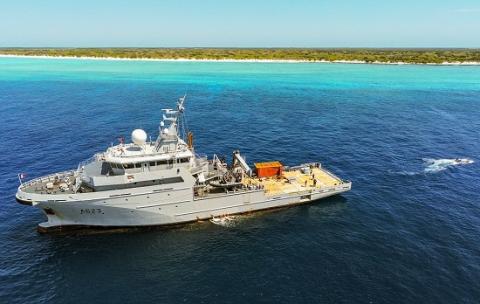
Mission Bougainville: "Working with the French Navy is an exceptional opportunity”
Laurine, a student in the second year of her Master’s in Marine Sciences at Sorbonne University, tells us about her journey towards the Bougainville Mission. A lover of the marine environment since childhood and involved in several associations, she aspires to combine her passion for the oceans and scientific research in this unique adventure."
Laurine will be assigned to La Réunion in tandem with Romain.
Can you tell us about your background?
Laurine: I'm 23 years old and studying for a Master 2 in Marine Sciences at Sorbonne University. Prior to that, I graduated from Aix-Marseille University with a bachelor's degree in Life and Earth sciences, which allowed me to immerse myself in the study of the marine environment right from the start of my university career.
I've long been fascinated by the diversity and workings of the oceans, and this passion has deepened over the course of my ten years of scuba diving and freediving.
At the same time, my involvement in a number of marine-related associations has enabled me to share my passion with the general public through scientific mediation workshops.
What motivated you to apply for the Bougainville Mission and how did you discover this opportunity?
L.: Since I was a child, I've followed Tara's expeditions, and I've been lucky enough to meet their teams on some of their stopovers. The Bougainville Mission, which I discovered at an information meeting, is a unique opportunity to deepen my knowledge of the ocean microbiome, while working hand in hand with the French Navy. It allows me to contribute to scientific research from a different angle, and to discover a military environment that I'm not yet familiar with.
I'm also motivated by the desire to share the richness of this invisible universe with the crew and local populations through mediation workshops.
The mission is being carried out in collaboration with the French Navy. What do you expect from this unique experience of working on board Navy ships?
L.: Working with the French Navy is an exceptional opportunity, combining scientific expertise and logistics. This experience will enable us to access areas that are usually difficult to access, thus increasing the possibilities for sampling.
I also hope to raise public awareness of the importance of plankton by organizing workshops for crew members and local communities encountered during stopovers. It's a unique opportunity to discover an environment that's still unknown to me, while joining a crew.
How are you preparing to take on scientific responsibilities with full autonomy during the mission?
L.: To prepare, I attended two scientific training courses with the other VOAs, one in Banyuls-sur-Mer and the other in Villefranche-sur-Mer. These courses enabled me to familiarize myself with the protocols and tools we'll be using, and gave me the confidence to carry out my tasks independently.
What challenges do you foresee during this mission and how do you plan to overcome them?
L.:These include the need to balance military missions with scientific objectives, unpredictable weather conditions, and restricted access to certain areas suitable for sampling due to logistical constraints.
To overcome these difficulties, I intend to work closely with the crew to coordinate our priorities and ensure that the scientific objectives are met. Exchanges with the previous class will also be invaluable in adopting the strategies that worked.
How do you think this assignment will enrich your career and personal development?
L.: This mission represents an invaluable opportunity to enrich both my career and my personal development. Professionally, working in such a dynamic environment will enable me to gain valuable practical experience and develop my skills, especially in project management and coordination with military imperatives.
On a personal level, this adventure will strengthen my ability to work independently while integrating into a demanding team. Interaction with crew members and local stakeholders will broaden my outlook on working in a marine and military environment.
What skills do you hope to acquire or develop during this assignment?
L.: During this assignment, I want to strengthen several key skills. Firstly, project management, to be able to effectively coordinate scientific and military tasks. I also aim to deepen my technical skills, particularly in data collection and analysis.
This mission will also enable me to develop my communication skills, working with crew members and scientists from a variety of backgrounds. Finally, I expect to improve my ability to work autonomously and deal with the unexpected in sometimes difficult conditions.
Have you ever thought about what you might do after Bougainville?
L.: After the Bougainville Mission, I plan to continue with a thesis in marine ecology.




